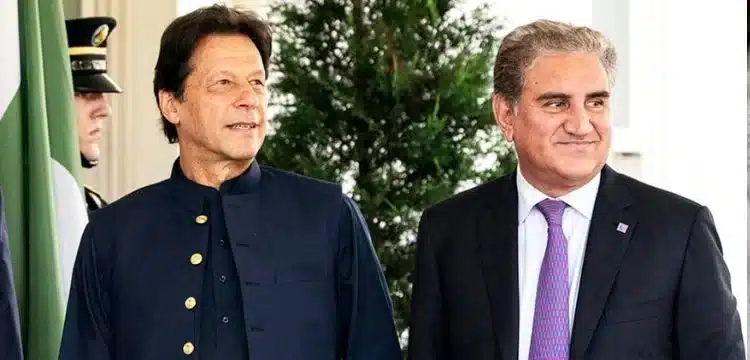[vc_row][vc_column][vc_column_text dp_text_size=”size-4″]In Islamabad, former Pakistani Prime Minister Imran Khan and his associate Shah Mahmood Qureshi have successfully obtained bail in connection with the May 9 riots case. This development unfolded during proceedings at the Anti-Terrorism Court, presided over by Judge Malik Ijaz, who directed both accused individuals to furnish surety bonds amounting to Rs1 lakh each.
The legal landscape has seen a series of bail approvals for Khan, with a total of 12 cases related to the May 9 rioting having received judicial consent. The courts, in a systematic fashion, have given their nod to the bail petitions submitted by Khan in these instances.
Read more: Imran Khans Son Seeks Twitter Support Pre-2024 Elections
Simultaneously, the court also addressed the bail petition of Sheikh Rasheed, a prominent figure associated with the Awami Muslim League, pertaining to the case of attacking the gate of a sensitive installation on May 9. Following due process, the bail petition was sanctioned upon Rasheed’s commitment to providing surety bonds totaling Rs200,000. Once the bonds were submitted, the court directed the relevant authorities to effect Rasheed’s release.
The legal developments surrounding Imran Khan and Shah Mahmood Qureshi underscore the significance of the May 9 riots case and the subsequent legal proceedings. Judge Malik Ijaz’s directive for both accused individuals to submit surety bonds reflects the customary legal requirements associated with bail.
Imran Khan, a prominent political figure in Pakistan, has faced a series of legal challenges related to the May 9 riots. The court’s approval of bail petitions in multiple cases suggests a nuanced legal process that assesses each case independently. The bail system, requiring surety bonds, is a standard procedure aimed at ensuring the accused’s commitment to attending future court proceedings.
Shah Mahmood Qureshi, a key associate of Imran Khan, also secured bail alongside the former prime minister. The court’s decision highlights the legal intricacies involved in the May 9 riots case, with each accused party undergoing scrutiny based on the specifics of their involvement.
In the broader context, the May 9 riots appear to have triggered a series of legal actions against various individuals, including political figures like Imran Khan and Sheikh Rasheed. The court’s approval of Sheikh Rasheed’s bail petition in the case of attacking a sensitive installation further adds to the legal narrative surrounding the events of May 9.
The requirement for surety bonds in these bail petitions underscores the judiciary’s emphasis on accountability and adherence to legal processes. The specified amounts for the surety bonds, such as Rs1 lakh for Imran Khan and Shah Mahmood Qureshi and Rs200,000 for Sheikh Rasheed, are consistent with prevailing legal norms.
As the courts grant bail in these cases, the legal proceedings continue to unfold, shedding light on the intricate details of the May 9 riots and the alleged involvement of key political figures. The multiple cases related to the same incident indicate the complexity of the legal landscape and the need for a thorough examination of each individual’s role.
Sheikh Rasheed’s involvement in the case of attacking a sensitive installation on May 9 adds another layer to the legal proceedings. The court’s approval of his bail petition following the submission of surety bonds signifies a standard legal process, ensuring that the accused party meets the prescribed conditions for release.
The directives for authorities to release Sheikh Rasheed after the submission of surety bonds highlight the procedural steps that follow the approval of bail petitions. These steps are integral to the legal system, ensuring that the release of individuals on bail is executed in accordance with established norms and regulations.
In conclusion, the recent developments in the May 9 riots case involving Imran Khan, Shah Mahmood Qureshi, and Sheikh Rasheed underscore the dynamic nature of legal proceedings. The court’s approval of bail petitions, the requirement for surety bonds, and the subsequent release of the accused individuals contribute to the evolving narrative surrounding this significant legal matter. As the legal process unfolds, further insights into the events of May 9 and the roles of key political figures continue to emerge, shaping the broader discourse on accountability and justice in Pakistan.[/vc_column_text][/vc_column][/vc_row]











